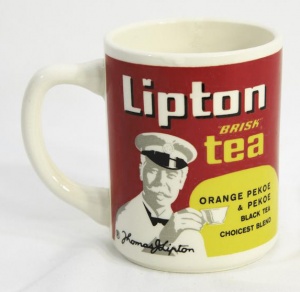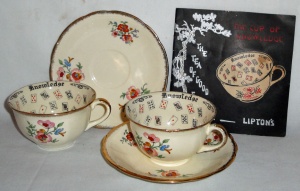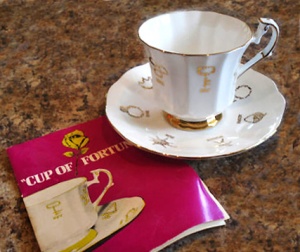Tea Company Cups and Saucers
From Mystic Tea Room
(add tea cat) |
|||
| (11 intermediate revisions not shown) | |||
| Line 1: | Line 1: | ||
| + | [[File:Lipton-Brisk-Tea-Mug.jpg|thumb|300px|right|Lipton "Brisk" Tea advertising art on a coffee mug.]] | ||
| + | |||
[[File:Alfred-meakin-liptons-sets-with-book.jpg|thumb|300px|right|Alfred Meakin Royal Marigold Cup of Knowledge sets with a Lipton Tea instruction booklet]] | [[File:Alfred-meakin-liptons-sets-with-book.jpg|thumb|300px|right|Alfred Meakin Royal Marigold Cup of Knowledge sets with a Lipton Tea instruction booklet]] | ||
| - | |||
[[File:Red-rose-number-one-and-booklet.jpg|thumb|300px|right|Red Rose Cup of Fortune number 1 and instruction booklet]] | [[File:Red-rose-number-one-and-booklet.jpg|thumb|300px|right|Red Rose Cup of Fortune number 1 and instruction booklet]] | ||
| - | |||
| - | Throughout the 20th century advertising cups and saucers were | + | == Nostalgic Label and Advertising Art == |
| + | |||
| + | Throughout the 20th century advertising cups and saucers were issued by many makers of coffee and tea. For the first half of the century these were usually straightforward promotions, sometimes only available to distributors or retailers, and sometimes also offered to the public as premiums. | ||
| + | |||
| + | Beginning with the nostalgia boom of the late 1960s, reproductions of old labels and advertisements for tea, coffee, soda pop, soup, and even obscure brands of dentifrice and baking powder began to appear on mugs, plates, trays, and tins. Many of these were produced by existing companies to keep their trademarks in play, or they were licensed by existing companies to manufacturers of china, glass, and metal wares for a small fee and then bought back to distribute as promotions. The most common method of reproducing such old labels and advertising art was by offset or screen printing, for which a flat surface was necessary. This led to the introduction of sleek, modern, straight-sided coffee mugs as the ideal china ware for decorating with a vintage label or graphic advertisement. As a result, old tea labels were suddenly grafted onto coffee mugs, a mismatch that label collectors overlooked in their search for "cool graphics." | ||
| + | |||
| + | The "fadeaway" style ad art on the Lipton's "Brisk" Tea coffee mug shown here is typical of the thoughtless fog into which the nostalgia craze led a generation of advertisement collectors. I know. I still have my copy of this cup. It is not a suitable vessel from which to sip tea. But there is it, in my cupboard, forever. | ||
The popularity of these nostalgic labels waned a bit during the 1990s and 2000s, but when the revolution in digital technology enabled the manufacture of very clean reproductions of old graphic art in short-run quantities, the makers of china, glass, metal, and plastic wares searched for — and found -- graphic label art from defunct companies, for which no licensing fees needed to be paid, and a glorious new age of reproduction label art appeared. At this point in time, it seems to me, as a graphic designer, that tea label nostalgia will be with us for quite some time to come. | The popularity of these nostalgic labels waned a bit during the 1990s and 2000s, but when the revolution in digital technology enabled the manufacture of very clean reproductions of old graphic art in short-run quantities, the makers of china, glass, metal, and plastic wares searched for — and found -- graphic label art from defunct companies, for which no licensing fees needed to be paid, and a glorious new age of reproduction label art appeared. At this point in time, it seems to me, as a graphic designer, that tea label nostalgia will be with us for quite some time to come. | ||
| - | == Fortune Telling Tea Cups from Tea Companies== | + | == Fortune Telling Tea Cups from Tea Companies == |
| + | |||
| + | Companies that trade in packaged tea have occasionally offered fortune telling tea cups as premiums with the purchase of their tea or have included cups in packages of tea. Lyons, the big player in the exterior signage "tea wars," did not indulge in metaphysics, but Lipton's and Red Rose produced [[Types of Divination|marked divination cups for readers]], accompanied by [[Tea Company Booklets|instructional booklets]]. Tea companies that did not issue cups have often have released [[Tea Company Booklets|company-sponsored instructional booklets about tea leaf reading]]. | ||
| + | |||
| + | More recently, some cup makers and markers, such as the Victorian Trading Co. and Tea With Karin, have flipped the script and packaged their [[Types of Divination|marked divination cups]] with "tea included." They do not sell the tea separately, but offer it as a "gift" or "bonus" when you purchase one of their [[Types of Divination|marked cups]], | ||
| + | |||
| + | <i><b>catherine yronwode</b><br>curator, historian, and docent | ||
| + | <br><b>The Mystic Tea Room</b></i> | ||
| - | + | [[Category:Tea]] | |
Latest revision as of 00:38, 7 September 2022
Nostalgic Label and Advertising Art
Throughout the 20th century advertising cups and saucers were issued by many makers of coffee and tea. For the first half of the century these were usually straightforward promotions, sometimes only available to distributors or retailers, and sometimes also offered to the public as premiums.
Beginning with the nostalgia boom of the late 1960s, reproductions of old labels and advertisements for tea, coffee, soda pop, soup, and even obscure brands of dentifrice and baking powder began to appear on mugs, plates, trays, and tins. Many of these were produced by existing companies to keep their trademarks in play, or they were licensed by existing companies to manufacturers of china, glass, and metal wares for a small fee and then bought back to distribute as promotions. The most common method of reproducing such old labels and advertising art was by offset or screen printing, for which a flat surface was necessary. This led to the introduction of sleek, modern, straight-sided coffee mugs as the ideal china ware for decorating with a vintage label or graphic advertisement. As a result, old tea labels were suddenly grafted onto coffee mugs, a mismatch that label collectors overlooked in their search for "cool graphics."
The "fadeaway" style ad art on the Lipton's "Brisk" Tea coffee mug shown here is typical of the thoughtless fog into which the nostalgia craze led a generation of advertisement collectors. I know. I still have my copy of this cup. It is not a suitable vessel from which to sip tea. But there is it, in my cupboard, forever.
The popularity of these nostalgic labels waned a bit during the 1990s and 2000s, but when the revolution in digital technology enabled the manufacture of very clean reproductions of old graphic art in short-run quantities, the makers of china, glass, metal, and plastic wares searched for — and found -- graphic label art from defunct companies, for which no licensing fees needed to be paid, and a glorious new age of reproduction label art appeared. At this point in time, it seems to me, as a graphic designer, that tea label nostalgia will be with us for quite some time to come.
Fortune Telling Tea Cups from Tea Companies
Companies that trade in packaged tea have occasionally offered fortune telling tea cups as premiums with the purchase of their tea or have included cups in packages of tea. Lyons, the big player in the exterior signage "tea wars," did not indulge in metaphysics, but Lipton's and Red Rose produced marked divination cups for readers, accompanied by instructional booklets. Tea companies that did not issue cups have often have released company-sponsored instructional booklets about tea leaf reading.
More recently, some cup makers and markers, such as the Victorian Trading Co. and Tea With Karin, have flipped the script and packaged their marked divination cups with "tea included." They do not sell the tea separately, but offer it as a "gift" or "bonus" when you purchase one of their marked cups,
catherine yronwode
curator, historian, and docent
The Mystic Tea Room







